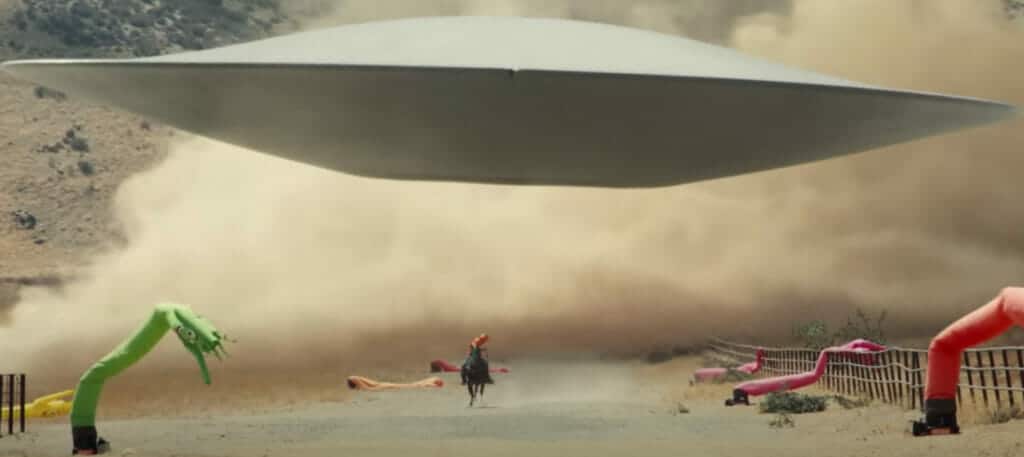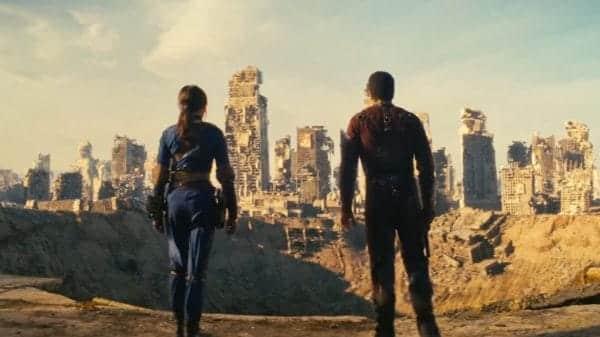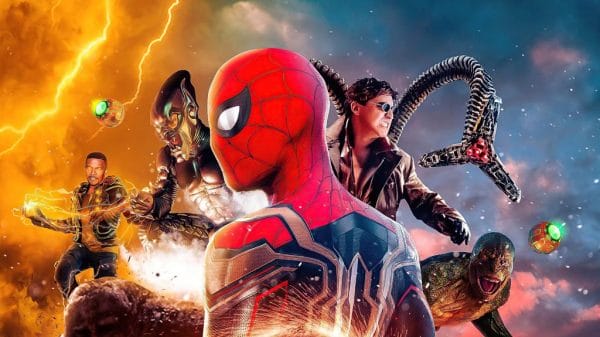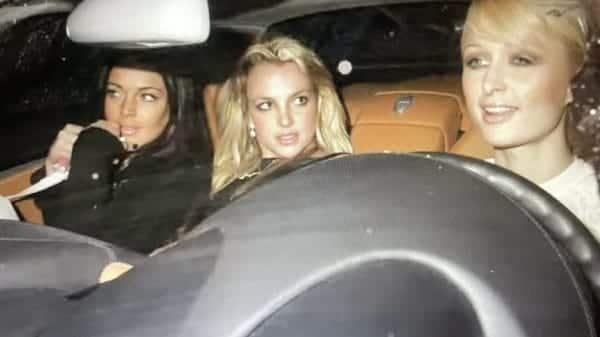Why, Gordy, why? What’s the deal with the shoe? Did OJ Survive? You may have been asking yourself some of these questions after seeing Jordan Peele’s newest hit movie Nope for the first time.
If you were like me, you furiously Googled questions about the ending before reaching the parking lot. Don’t worry, we’re not alone. Fan theories and commentary have flooded the internet over the last few weeks attempting to dissect every aspect of Nope.
After scanning the internet for hours, trying to find some answers to what people thought the shoe stood for, I was left pretty disappointed. Many articles or YouTube videos spent most of their time recapping plot points or offering shallow theories. Where’s the depth? The substance? The meat?! Peele’s first two movies were filled with so much social commentary, and Nope, at least for me, was right in line with those movies. But the internet failed me, so I had no choice but to dig deep, relying on commentary from a few talented writers and clues from Jordan Peele himself, to come up with some of my own answers. Here are my 4 major themes from Nope.
The Spectacle
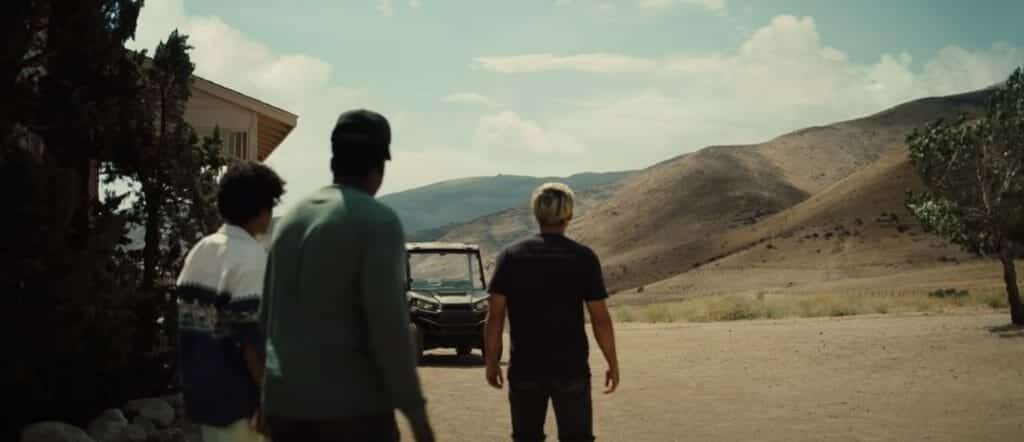
Of all the themes Nope explores, Jordan Peele and his cast have said themselves it most explores spectacle. In an interview with TODAY, he explained what he means by this term:
“When we’re driving in traffic and there’s an accident, that traffic slows down. It’s because everybody’s sneaking a peek at that awful spectacle and its slowing everybody down. And so I latched onto that and said let’s make a movie about that.”
Jordan Peele / Today
In Nope, Jean Jacket is that awful spectacle. It is the object that every character latches on to and focuses on. But the consequences for engaging in the spectacle in Nope aren’t ten extra minutes in traffic but getting consumed by a flying alien. Halfway through the movie, we learn that looking at Jean Jacket, engaging the spectacle, upsets it and causes it to hunt and kill. Therefore, one could be right under Jean Jacket and be safe, as long as they don’t look up and engage it. Or I guess as safe as one can be under a flying alien.
Not engaging with the awful spectacle is the only way to survive in Nope’s universe. We also see this with Jupe on the set of “Gordy’s Home,” the sitcom he starred on as a child. As Jupe remembers the horrific attack by the chimpanzee during a live recording of an episode, we see Jupe hiding under a table as the animal wanders around the room, covered in blood. As the chimpanzee makes his way toward the hiding Jupe, we see a shoe standing straight up in the middle of the room, breaking the laws of gravity. This catches Jupe’s attention, which is told through a close-up shot of the shoe followed by an over-the-shoulder shot of Jupe, and he becomes entranced by it.
As Gordy approaches the distracted Jupe, he doesn’t go to attack him but instead sticks out his fist for one of their iconic first bumps. The importance of this scene is that Jupe doesn’t engage with the current spectacle. By not looking Gordy directly in the eyes by looking at the shoe saves his life. At least at that moment. By looking at the shoe, Jupe engages with a whole new spectacle: supernatural phenomena. We see, years later, his character starts to pursue the monetization of this spectacle through his live show at Jupiter’s Claim, where he uses horses to lure UFOs out in front of a paying audience.
Monetization of Spectacle
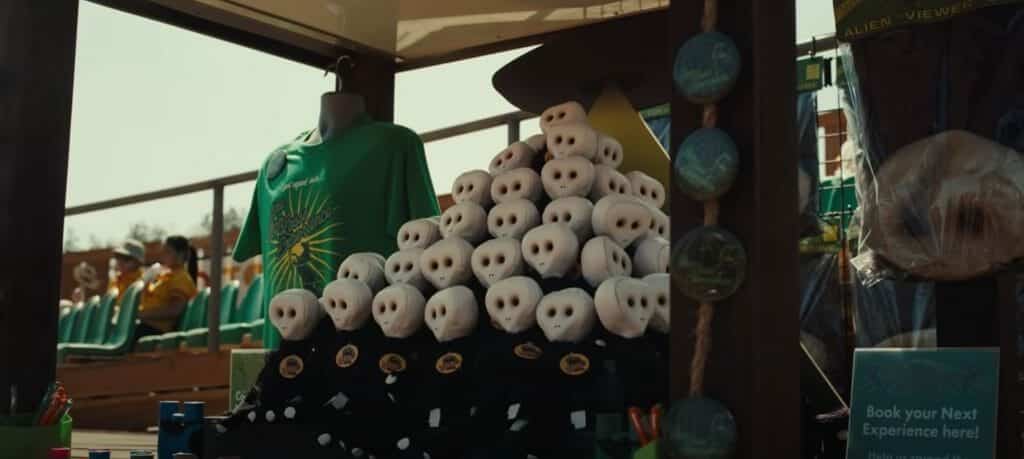
The monetization of spectacle is another huge theme in Nope. As Trill Mag’s very own Izzy Cardy, notes:
“One of the film’s main characters: the former child-star Ricky Park (Steven Yeun), has a whole show based around the UFO. He sacrifices horses in front of large crowds to draw the UFO out. And during one of these shows, a large crowd, including Ricky, gets devoured. It’s horrific. But also a testament to the lengths people will go to make money.”
Izzy Cardy / Trill Magazine
Jupe isn’t the only one trying to monetize Jean Jacket. Upon realizing a UFO is squatting near Haywood’s ranch, OJ and Emerald decide to pursue the “Oprah Shot” in hopes it will bring them money and fame. They fully commit to their goal, buying multiple surveillance cameras, hiring distinguished filmmaker Antlers Holst, and spending weeks planning and carrying out an elaborate plan to capture the UFO on camera. All of their actions are motivated by monetizing Jean Jacket.
We see further attempts at monetizing spectacle through the TMZ reporter showing up to try and capture the flying alien and Antlers Holst abandoning OJ and Emerald’s plan to get his own perfect shot of the predatory creature. We all know how it ends for both of them. Central to Nope is the idea of monetizing spectacle, of going to ridiculous ends to try and make money. Every character in Nope is pursuing the money and fame that come along with capturing big moments, with making it onto the big screen.
Hollywood’s Exploitation
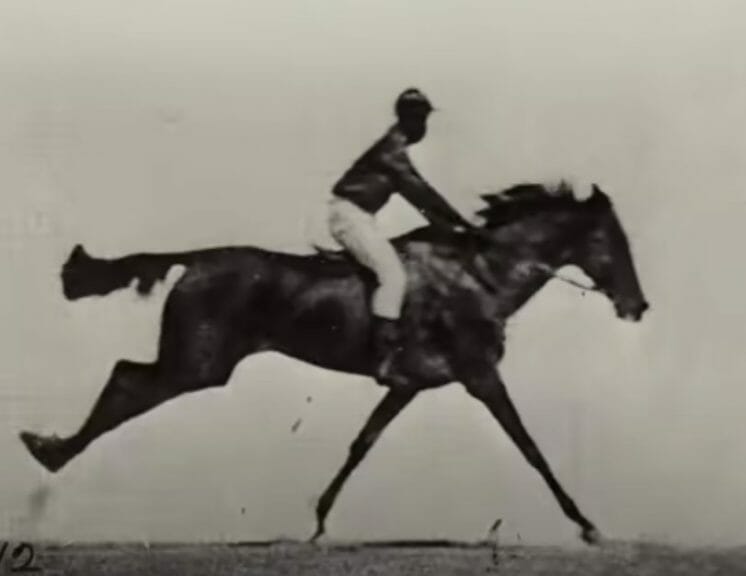
Tied into this overarching theme of monetizing spectacle is exploitation. By these characters manically trying to capture videos of a Jean Jacket, we see horses killed, lives lost, and a very pissed-off flying alien. The way that this monetization is pursued is exploitative. It’s silly to say, but at any point was Jean Jacket’s opinion considered by all those trying to capture it on video? Of course not, because the way monetizing spectacle is pursued in Nope is exploitative. And what about the way Lucky is treated by the cast of the Hollywood commercial? OJ is very obviously uncomfortable on the Hollywood set, and as the crew tries to ready the horse for the commercial, he tells them to back off and not get behind the horse. But the crew does not listen, trying to move around the towering animal like it’s a prop, and the horse spooks and reacts aggressively.
How fitting is it that the movie takes place in and on the outskirts of Hollywood? The monetization of spectacle and exploitation is Peele’s biggest critiques of the entertainment industry and everything wrong with it. Rich Brody, in his New Yorker article, notes that Nope:
“…is an exploitation film—which is to say, a film about exploitation and the cinematic history of exploitation as the medium’s very essence.”
Richard Brody / The New Yorker
Part of Hollywood’s exploitation includes denying opportunities to people of color, sexual harassment, and the erasure of people’s history. In Nope, we learn that the first ever movie was created by Eadweard Muybridge in the later 1800s, which filmed a galloping horse with a black jockey. The jockey, Emerald tells the cast in the Hollywood commercial, was their great-great-great grandpa, Alistair Haywood. No one ever knew this because the name of the jockey was never recorded; the history was covered up, a fact that’s evident by the blank faces of the Hollywood cast. The Haywood family history was erased by Hollywood, omitting their great-great-great grandpa’s name from the credits. The fact that the Eadweard Muybridge story is actually a true story and that an extended search on the internet will turn up no recorded name for the black jockey shows that no hyperbole is in effect through Alistair Haywood in Nope. Hollywood actually did this and continues to do this on a day-to-day basis, and Nope sheds light on the issues of Hollywood’s exploitation and erasure of history. As Jordan Peele notes in his interview with GQ:
“We got to do that big original blockbuster movie, and that in itself is part of what the movies about. It’s about taking up that space. It’s about existing. It’s about acknowledging the people who were erased in the journey to get here.”
Jordan Peele / GQ
Unprocessed Trauma
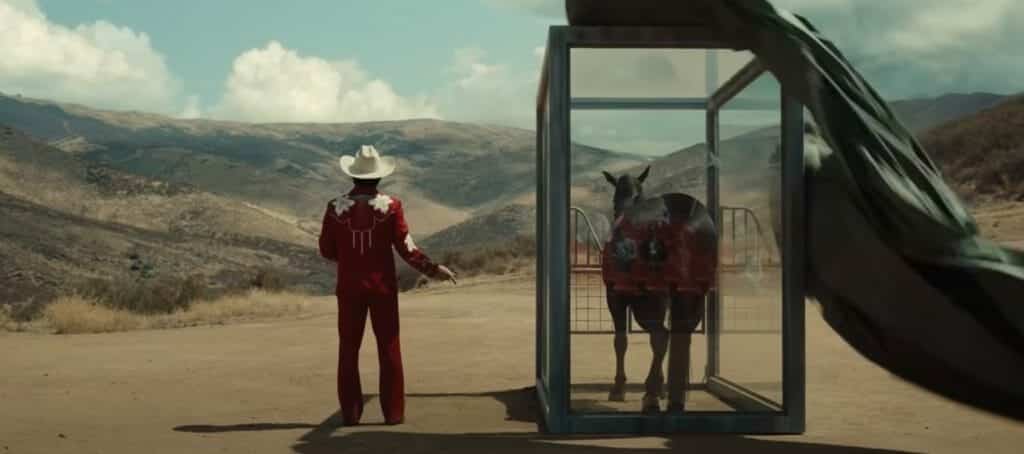
One of the most important themes Nope touches on is the damage of unprocessed trauma. In the movie, we learn that Jupe went through a traumatic event at a very young age. He witnessed something horrific. Based on my theory, the real reason he survived this event was that he was looking at, distracted by, the standing shoe. But in Jupe’s mind, he isn’t killed because he has some special connection to dangerous creatures that others don’t. He survived the Gordy’s Home incident because of some inherent quality that makes creatures like him, giving rise to his God Complex.
Moments before Jupe is about to let the horse out for Jean Jacket during his first live show, we hear him hype himself up and proclaim his destiny, telling himself he was “born to do this” or born to work with dangerous creatures. Why? Because he survived the Gordy’s Home incident. That event gave Jupe his God Complex and brought him to believe he can host a live show with Jean Jacket.
But Jupe misinterprets and misremembers these events. There was no special quality he possessed that kept him alive other than the fact he was looking at the shoe. By misremembering the traumatic event he experienced, Jupe cannot work through his trauma and process it. It bestows him with a God Complex that makes him think he can connect with Jean Jacket, that he was born to do it. By not working through his trauma, Jupe is escorted to his downfall.
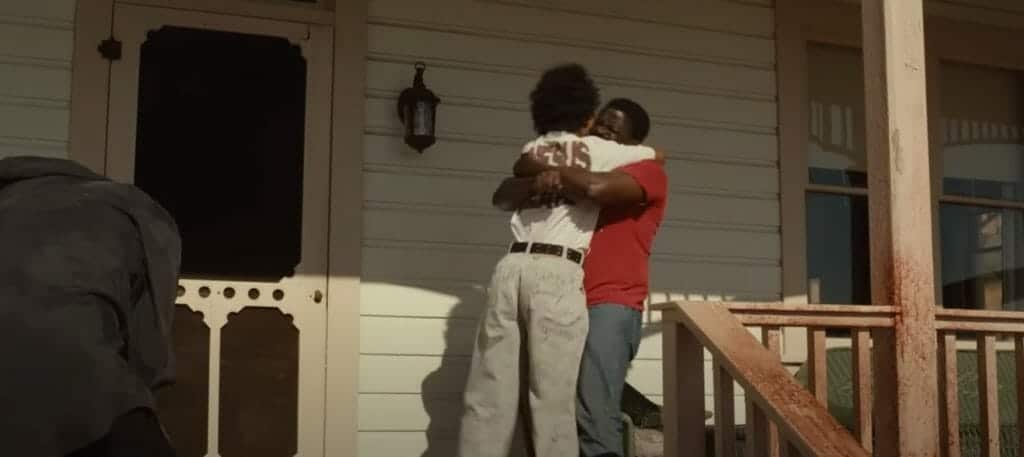
Sometimes we create these skewed narratives when thinking back to traumatic events because it helps us work through them more easily. We misremember details and tweak them to be the version we like. This is exactly what Jupe does. When we do this, it sets us back. It doesn’t allow us to really work through that trauma for what it is. It’s a distraction. Jordan Peele seems to be saying, through Jupe, that when we do this, we can really do a lot of damage to ourselves. Instead, maybe we should face things head-on and embrace the trauma, seeing it for exactly what it is.
Have your own thoughts on what some of the scenes in Nope mean? Drop a comment in the comment section below.


